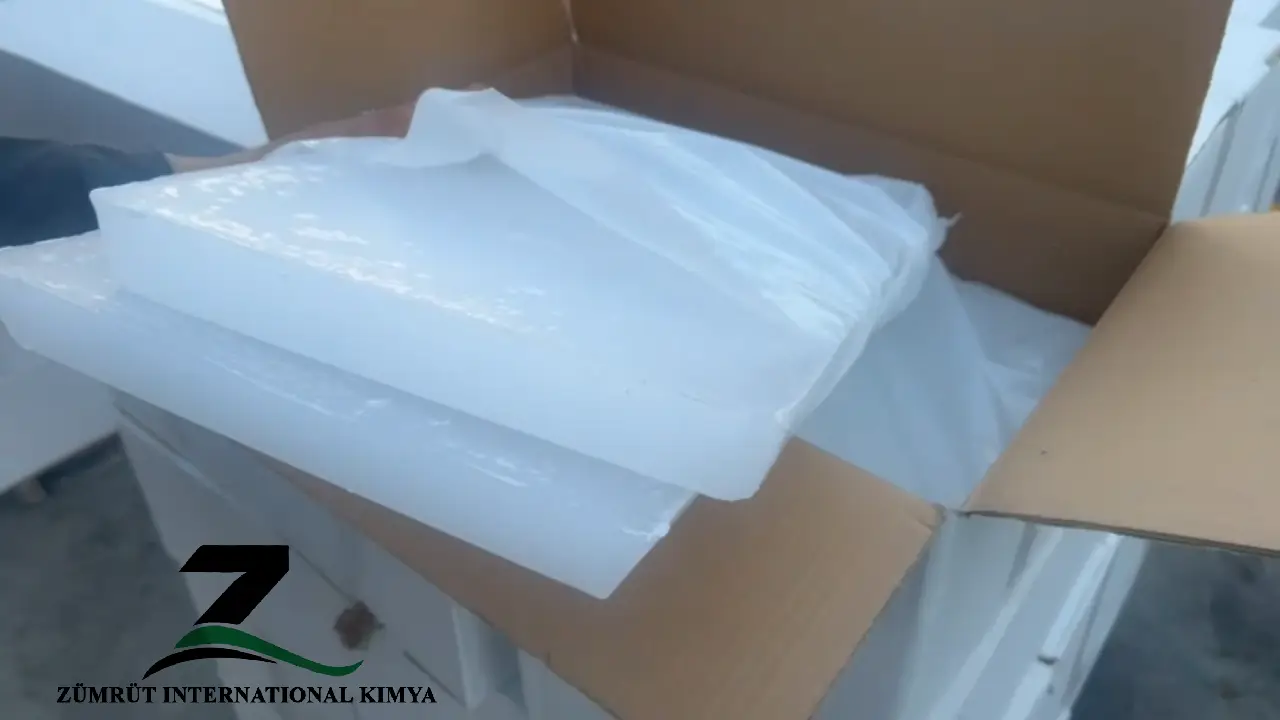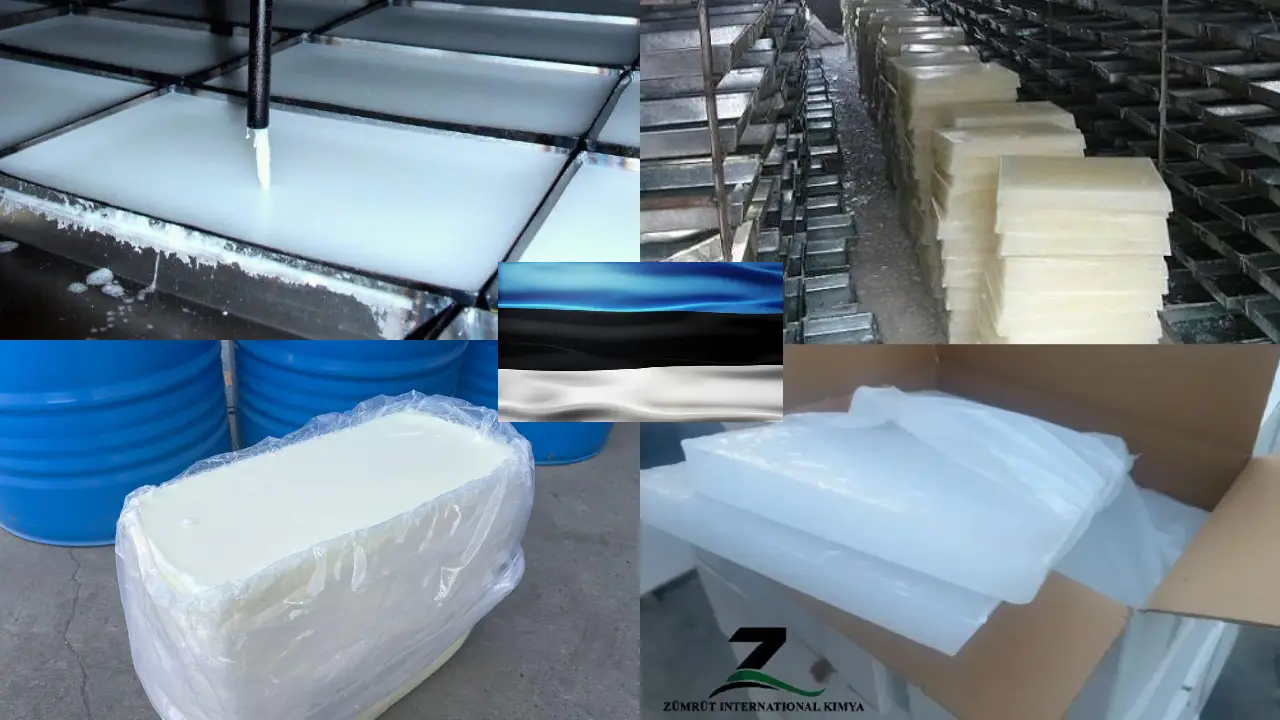
- Paraffin and Its Different Grades
- Choosing the right paraffin grade
- Which paraffin grades are most widely used in Estonia
- Packaging of various paraffin grades for Estonia
- Key Estonia ports for receiving paraffin grades
- Domestic and foreign Paraffin Supplier Estonia
- Specifications of semi-refined paraffin with oil grade 1%, 1-2% and 3-5% for Paraffin Supplier Estonia
Paraffin and Its Different Grades
Paraffin is a white or colorless soft solid derived from petroleum, coal, or oil shale. It’s composed mainly of straight-chain alkanes and is widely used in candles, cosmetics, packaging, rubber, and as a moisture barrier. Paraffin comes in various grades, each suited for specific industrial or commercial applications.
- Fully Refined Paraffin Wax
Oil content: <0.5%
Appearance: White, odorless, and highly pure
Applications: Cosmetics, pharmaceuticals, food packaging, candles
Features: High purity, excellent color and odor stability - Semi Refined Paraffin Wax
Oil content: 1% , 1–2%, 1-3% , 3-5%, 5-7%
Appearance: White to slightly off-white
Applications: Candle-making, polishes, waterproofing, packaging
Features: Less refined than fully refined, but more economical - Slack Wax
Oil content: 5–30%
Appearance: Yellowish or brownish, more viscous
Applications: Lubricants, matches, rust protection, paraffin production
Grades:
Light Slack Wax (lower oil content, lighter color)
Heavy Slack Wax (higher oil content, darker and more viscous) - Microcrystalline Wax
Oil content: Variable
Appearance: More elastic and tacky than paraffin wax
Applications: Cosmetics, adhesives, coatings, pharmaceuticals
Features: Smaller crystals, more flexible and sticky
Choosing the right paraffin grade
Selecting the appropriate paraffin grade is crucial to ensure optimal performance, cost-efficiency, and product safety. Here are key factors to consider when choosing a paraffin grade for your application:
- Application Purpose
Candles & Cosmetics: Use fully refined paraffin wax for its purity and consistent performance.
Packaging & Waterproofing: Semi refined paraffin wax provides good performance at a lower cost.
Industrial Lubricants & Matches: Slack wax (light or heavy) is ideal due to its higher oil content.
Pharmaceutical & Personal Care: Microcrystalline wax is preferred for its tackiness and elasticity. - Oil Content
Lower oil content (e.g., <0.5%) is better for clean-burning and high-purity applications.
Higher oil content (5–30%) offers better lubrication and is more suitable for industrial use. - Melting Point
Affects how the wax behaves under heat.
Choose lower melting points for easy application (e.g., skin creams).
Higher melting points are better for structural integrity (e.g., container candles or technical coatings). - Purity and Color
High-purity white waxes are best for visible or skin-contact products.
Lower purity grades are sufficient for technical or hidden industrial applications. - Budget Constraints
Fully refined paraffin is costlier but essential for premium or regulated products.
Semi refined and slack wax are more economical for general or bulk industrial use.

Which paraffin grades are most widely used in Estonia
In Estonia, the most widely used paraffin wax grades reflect the country’s demand in sectors like candle manufacturing, packaging, cosmetics, and light industry. Estonia, like most Baltic states, imports nearly all its paraffin wax, primarily from EU producers.
Most Widely Used Paraffin Grades in Estonia
- Fully Refined Paraffin Wax
Oil content: <0.5% - Semi Refined Paraffin Wax
Oil content: 0.5–3% - Slack Wax (Light & Heavy)
Oil content: 5–30% - Microcrystalline Wax (niche use)
Packaging of various paraffin grades for Estonia
- Fully Refined Paraffin Wax
Packaging:
Carton boxes (usually 25 kg net weight)
Plastic-wrapped slabs inside cartons
Block/slab form (rectangular, easy for melting and handling)
Stacking: Palletized (often 1 ton per pallet, shrink-wrapped for stability) - Semi Refined Paraffin Wax
Packaging:
Cardboard cartons or kraft paper bags, each ~25 kg
Sometimes PE-laminated paper to prevent sticking
Transport: Palletized and shrink-wrapped (1 ton pallets) - Slack Wax (Light & Heavy Grades)
Packaging options:
Steel drums (typically 180–210 liters, 180–200 kg net weight)
IBC tanks (Intermediate Bulk Containers – 1,000 liters)
Bulk in flexitanks (20 MT in ISO containers)
Used by: Blenders, processors, and industrial refineries - Microcrystalline Wax
Packaging:
Cartons (20–25 kg) with inner PE liners
Plastic bags inside boxes to maintain purity
Form: Slabs or pastilles
Markets: Cosmetics and pharmaceuticals; packaging must preserve hygiene
Key Estonia ports for receiving paraffin grades
- Port of Muuga (Tallinn Port)
Location: Near Tallinn, Estonia’s capital - Port of Paldiski
Location: 45 km west of Tallinn - Port of Sillamäe
Location: Northeastern Estonia, near Russian border
Domestic and foreign Paraffin Supplier Estonia
- SIA Candle Supply Baltic (Tallinn Office)
Distributor of paraffin waxes and blends for candle makers. - Estinord Trading OÜ
Supplies raw materials for chemical and cosmetic production. - Balti Lats OÜ
General industrial chemical distributor serving Estonia, Latvia, and Lithuania.
International Paraffin Supplier Estonia
These companies export paraffin wax to Estonia, often through Baltic ports or regional distributors:
- Zümrüt International Kimya (Turkey)
Supplies fully refined, semi-refined, and slack wax to Baltic clients.
Known for consistent quality, competitive pricing, and REACH compliance.
Ships via Muuga Port or Polish routes. - Polwax S.A. (Poland)
Leading EU producer of high-quality paraffin waxes.
Specifications of semi-refined paraffin with oil grade 1%, 1-2% and 3-5% for Paraffin Supplier Estonia
| Property | 1% Oil Content | 1–2% Oil Content | 3–5% Oil Content |
| Oil Content | ≤ 1% | 1–2% | 3–5% |
| Melting Point (°C) | 58-60 | 58–62 | 56–60 |
| Color | White to snow white | Off-white to cream | Pale yellow to off-white |
| Odor | Odorless or very mild | Mild hydrocarbon scent | Noticeable hydrocarbon scent |
| Penetration @25°C (dmm) | ≤ 15 | 15–20 | 20–30 |
| Viscosity @100°C (cSt) | 4.0–5.5 | 4.5–6.0 | 5.5–7.5 |
| Flash Point (°C) | ≥ 240 | ≥ 230 | ≥ 220 |
| Moisture | None | None | None |
| Ash Content | ≤ 0.03% | ≤ 0.05% | ≤ 0.1% |
| Congealing Point (°C) | 58–62 | 57–61 | 55–59 |
| Applications | Cosmetics, food-grade candles, packaging | Candle making, paper coating, crayons | Matches, plywood, rubber, industrial candles |


